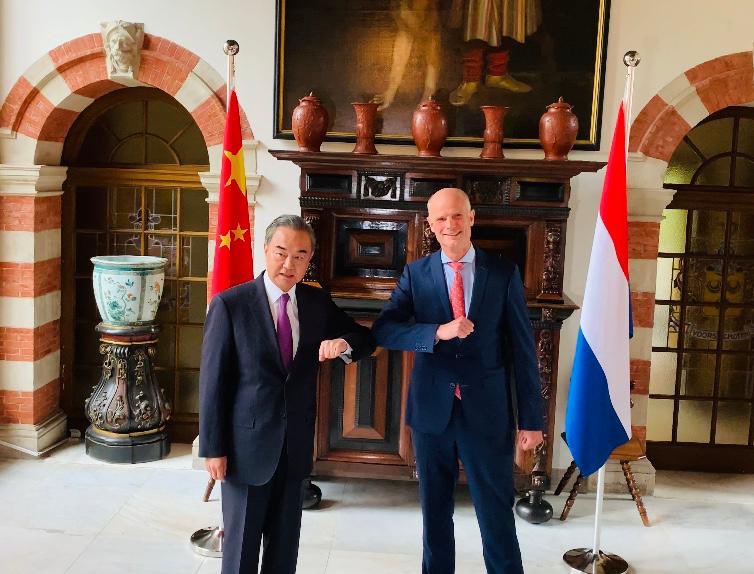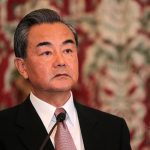
China Monitor is our brand-new program that analyses China’s economic and foreign policies. It also aims to predict the consequences of Beijing’s policy for the global economy, the EU as well as Central and Eastern European countries such as Poland.
Date: 8 September 2020
Author: Łukasz Kobierski
Wang Yi’s Visit to Europe and Human Rights Concerns
During the nearly week-long visit of the Minister of Foreign Affairs of the People’s Republic of China (PRC) – Wang Yi, to Italy, the Netherlands, Norway, France and Germany, representatives of these countries often reminded about human rights violations in China. This was the first visit of a Chinese Minister to European countries since the outbreak of the COVID-19 pandemic.

The Minister of Foreign Affairs of the People’s Republic of China (PRC) – Wang Yi, visited five European countries between August 26 and September 1. In the following article, I will focus solely on the opinions of the representatives of the visited countries about the violations of human rights, expressed during Wang Yi’s visit.
During the visit to Italy, the Minister of Foreign Affairs of this country – Luigi Di Maio said, among others, that China should respect the freedom of speech. He signaled the European Union’s disapproval of the Hong Kong national security law, imposed on the metropolitan area by Beijing. Parallelly to the conversation between the two ministers, other Italian parliamentarians held a meeting at the Italian MFA with a Hong Kong activist in exile – Nathan Law.
A major challenge awaited the head of the Chinese MFA in the Netherlands. The Minister of Foreign Affairs – Stef Blok, accepted him there. Blok expressed his opinion about the “extremely worrying developments” in Hong Kong. Additionally, he “specifically called attention to the restriction of freedom of religion and belief in China, which affects in particular Muslims, Christians and Tibetan Buddhists.” The Dutch politician – Martijn van Helvert, whose Christian Democratic Appeal party is a member of the current ruling coalition, used the visit to call for tougher action against Beijing. “The Dutch government must be clear that there can be no resumption of ‘business as usual’ with Beijing while the persecution of Uyghur Muslims, Christians and other religious and ethnic minorities in China continues,” he said at a press conference with two Uyghur activists. Moreover, Wang Yi was to be invited to participate in the proceedings of the foreign affairs committee of the Dutch parliament in order to discuss the human rights issues in China.
Support Us
If content prepared by Warsaw Institute team is useful for you, please support our actions. Donations from private persons are necessary for the continuation of our mission.
Afterwards, Wang Yi went to Norway, where none of the CPC’s senior officers have arrived for 15 years. The reason for the lack of visits was the award of the Nobel Peace Prize by the Norwegian Nobel Committee to the Chinese dissident – Liu Xiaobo, in 2010. Norwegian Minister of Foreign Affairs – Ine Eriksen Søreide, unlike her Italian and Dutch counterparts, did not mention the situation in Hong Kong, although she said that both sides discussed human rights issues. At the press conference, Yi warned against awarding the Nobel Prize to Hong Kong activists, as this would interfere in China’s internal affairs.
In France, the Chinese representative met with President Emmanuel Macron and Minister of Foreign Affairs – Jean-Yves Le Drian. Likewise, Macron expressed his concern about human rights violations in Xinjiang and Hong Kong. Wang Yi, in a speech given at the Paris-based think-tank “Institut Français des Relations Internationales” (IFRI), stated that there are no longer any detainees in Xinjiang and all of them have completed the so-called “re-education courses.”
Yi’s last visit was to Germany, where he met with Minister of Foreign Affairs – Heiko Maas. Regarding the case of Hong Kong, Maas stated that he wanted the principle of “one country, two systems” to be fully implemented. Furthermore, he called for the withdrawal of China’s national security law for Hong Kong and urged to hold parliamentary elections there soon. Additionally, he proposed to send a UN observation mission to investigate the human rights situation of the Uyghur minority in the Xinjiang region along with the camps located there. Just like in Norway, Wang Yi stated that this would interfere in China’s internal affairs, which should not be meddled with.
Wang Yi’s visit in the context of building a positive image and rejecting the stigma of a state that violates human rights can certainly be considered a failure. In almost every meeting with representatives of the visited countries, attention was drawn to the situation in Hong Kong, Xinjiang or the lack of freedom of religion. Wang Yi’s visits to European capitals were often accompanied by protests of Uyghur minorities and supporters of democratic Hong Kong. The IPAC organization (The Inter-Parliamentary Alliance on China) also supported the protests. Further reminders by Western countries and the EU of human rights violations in China should be expected. The question is how much will this affect economic relations between these players. We will have to wait a while for an answer. As far as the EU is concerned, it is worth checking whether an investment agreement between China and the EU, which is a priority of the German presidency of the Council of the EU, will be signed. This will give us a picture of future relations between the two powers.
All texts published by the Warsaw Institute Foundation may be disseminated on the condition that their origin is credited. Images may not be used without permission.

















